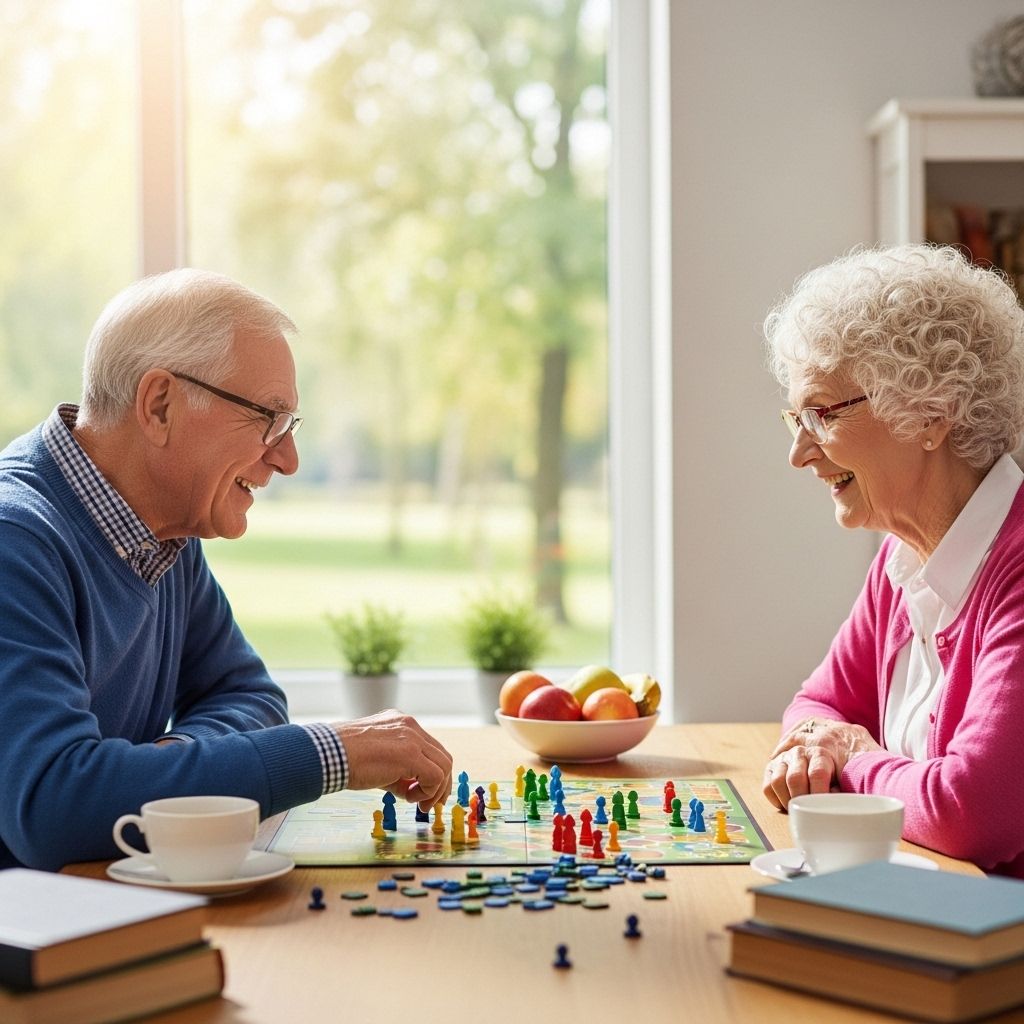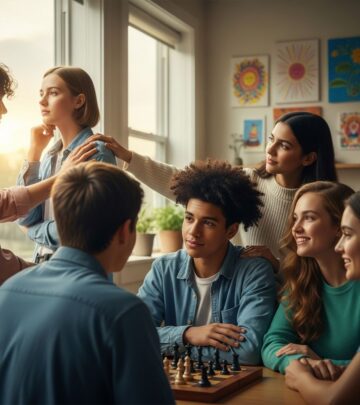How Regular Socializing May Shield Your Brain From Dementia, According to Science
Consistent connections boost mood and strengthen thinking skills as you age.

A Simple, Powerful Habit: How Socializing May Protect Your Brain
Can meeting up with friends, chatting with neighbors, or joining a hobby group actually help prevent dementia? A new study and growing scientific consensus say yes. As the world’s population ages, finding easy, accessible ways to protect brain health and independence is vitally important. This article explores recent research on how socializing impacts dementia risk, why these effects are observed, expert insights, and tips to incorporate more meaningful interaction as part of a healthy lifestyle.
What Did the Latest Study Reveal?
Scientists have long suspected that staying socially active might help preserve brain function—but the newest study amplifies just how significant these effects may be. Researchers analyzing the health records and social habits of thousands of adults over several years found:
- People who engaged in regular social activities—such as meeting friends, volunteering, or joining clubs—had a substantially lower risk of developing dementia as they aged
- Socially active adults were also more resistant to age-related memory loss compared to their less social peers
- The benefits were observed across a variety of social activities, from lively group events to quiet chats with loved ones
Importantly, the study noted that frequent socializing may act as a buffer against dementia even for people already at higher risk due to genetics or other health conditions. In fact, older adults with robust social networks had up to a 38% lower risk of developing dementia over the study period compared to those who interacted with others less frequently.
Why Does Socializing Help Protect Your Brain?
The link between social connections and brain health is complex but increasingly well-supported:
- Mental stimulation: Conversations, shared activities, and new experiences challenge the brain, keeping memory and thinking skills sharp
- Emotional benefits: Positive relationships reduce feelings of loneliness and depression, both of which are linked to cognitive decline
- Healthy habits: Social people are more likely to stay physically active, seek medical care, eat nutritious foods, and maintain healthier lifestyles overall
- Stress reduction: Social support helps buffer stress, which can damage the brain over time if unaddressed
- Purpose and routine: Having regular plans and emotional bonds gives older adults a reason to stay engaged and active
According to Dr. Gary Small, M.D., Director of Geriatric Psychiatry at Harbor-UCLA Medical Center, “Social engagement is cognitive exercise. Connecting with others can stimulate memory, language skills, and emotional centers in the brain, all of which are crucial for resilience against dementia.”
What Counts as “Socializing”?
Not everyone enjoys loud parties or big groups, but the good news is that even small and simple interactions count. The recent research highlights a wide range of activities:
- Chatting with friends or family—by phone, video call, or in person
- Joining a hobby club, religious group, or exercise class
- Volunteering or community involvement
- Attending lectures or educational courses
- Even brief everyday encounters—like talking with a barista or neighbor
What’s most important is consistency. Meeting someone weekly or even monthly builds a social rhythm, which research shows is particularly beneficial for memory and mood. The recent study found that people who saw friends “two or more times per week” had the strongest protection, but any increase in meaningful contact can help.
Is Socializing Alone Enough to Prevent Dementia?
While maintaining social connections is a crucial pillar, experts emphasize that it is one piece of the puzzle. Dementia risk is influenced by:
- Genetics (family history)
- Chronic health issues (like diabetes or heart disease)
- Lifestyle factors (diet, physical activity, sleep)
- Education level and lifelong learning
Still, regular socializing offers benefits that extend well beyond cognitive health: enhanced physical well-being, emotional resilience, and a greater overall sense of purpose. Combined with healthy eating and staying active, meaningful relationships form part of the “gold standard” recommendations for healthy aging.
What Do Experts and Other Research Say?
This new study adds weight to a growing pile of evidence from around the globe:
- International studies have found that isolation increases dementia risk by up to 50%
- People who are never married have a 42% higher risk of developing dementia, and those who have been widowed face a 20% greater risk, suggesting the power of close personal bonds
- Programmes like Singing for the Brain demonstrate that even people with moderate or severe dementia can find joy, connection, and cognitive benefits through group activities
According to Dr. Doug Brown at the Alzheimer’s Society, “A person-centred approach that values each individual’s interests and abilities, and includes opportunities for social connection, is crucial not just for quality of life but for actual outcomes in dementia care.”
Real-Life Impact: Social Connection in Action
Consider the case of social programming in care homes: When residents participate in just one hour of social interaction per week, research observed measurable improvements—less agitation, more alertness, and even reduced pain levels. These effects weren’t just noticed by doctors; family members reported a stronger sense of connection and meaning when they shared enjoyable activities together.
In community settings, regular engagement—whether in the form of a game night, a gardening club, or neighborly visits—provides a buffer against loneliness, which can otherwise compound memory loss and emotional distress.
Practical Ways to Boost Your Social Life as You Age
It’s never too late to nurture or expand your social circle. Here are some evidence-backed ideas for older adults, their families, and caregivers:
- Schedule regular get-togethers—weekly coffee, book clubs, or a card game night
- Explore new interests—take up a class, join a craft group, or start a walking club
- Volunteer your time—schools, libraries, hospitals, and charitable organizations often welcome older volunteers
- Leverage technology—use video calls or online communities to stay connected with family and friends far away
- Adopt low-pressure routines—even a daily walk in a park can lead to quick chats and new friendships
- Engage intergenerationally—connect with younger family, neighbors, or students for a refreshing change in perspective
For those with mobility or health challenges, even small, steady efforts add up. “The goal isn’t a packed social calendar—but consistent, meaningful connection,” notes Dr. Small.
Frequently Asked Questions (FAQs)
Q: Can socializing reverse dementia or memory loss?
No, there is no evidence that social activity can reverse dementia once it has developed. However, social activity may help slow the progression of symptoms and is associated with better quality of life for both people with dementia and their caregivers.
Q: Are brief interactions (such as chatting with a shop clerk) beneficial?
Yes, even short encounters count. Studies indicate that a mix of both deep and incidental social contact is protective, especially when it’s consistent over time.
Q: What if my loved one with dementia seems uninterested in social activities?
It can be challenging, but experts recommend gently introducing group activities matched to the person’s current abilities and interests. Activities like singing groups have proved successful for people at all stages of dementia.
Q: Is social isolation really that dangerous?
Yes, the World Health Organization and numerous studies link prolonged social isolation to increased dementia risk, higher rates of depression, and faster physical decline.
Q: Can technology help older adults socialize?
Absolutely. Video calls, online support groups, virtual classes, and shared games can be excellent tools—especially for people with limited mobility or family far away.
Table: Key Findings on Socialization and Dementia Risk
| Key Finding | Details / Source |
|---|---|
| Frequent socializing reduces dementia risk | Up to 38% lower risk among active older adults |
| Isolation increases risk | Social isolation linked to 50% higher risk of dementia |
| Beneficial for all ability levels | Even people with advanced dementia benefit from group social activities (e.g., singing) |
| Small, regular interactions count | Consistency and quality matter as much as frequency |
| Emotional and cognitive benefits | Less agitation, better mood, slower memory loss in social settings |
| Wider health benefits | Enhanced emotional well-being, lower rates of depression, greater sense of purpose |
Final Thoughts: A Small Change With Big Impact
Dementia and memory loss are among the most feared challenges of aging, yet modern research is clear: simple, regular social interaction has a powerful protective effect. Whether it means calling a friend, joining a group, or seeking meaningful conversation, these everyday habits may be one of the most impactful—and easiest to implement—ways to maintain a healthy brain into later life.
“Social interaction isn’t just pleasant—it’s essential for aging well,” emphasizes Dr. Small. “Start where you are, reach out, and value every connection. Your brain will thank you.”
References
- https://keystone.health/dementia-social-interaction
- https://pmc.ncbi.nlm.nih.gov/articles/PMC5089222/
- https://www.healthline.com/health/alzheimers-dementia/staying-social-dementia-risk
- https://www.goodhousekeeping.com/health/wellness/a65822691/study-socializing-lower-risk-of-dementia/
- https://www.goodhousekeeping.com/health/wellness/a64076250/study-exercise-lower-dementia-risk/
- https://www.aol.com/study-says-doing-one-thing-164000653.html
- https://www.goodhousekeeping.com/health/wellness/a65207455/writing-letters-can-reduce-dementia-risk/
- https://www.goodhousekeeping.com/health/wellness/g65903434/hobbies-good-for-your-brain/
Read full bio of Sneha Tete












